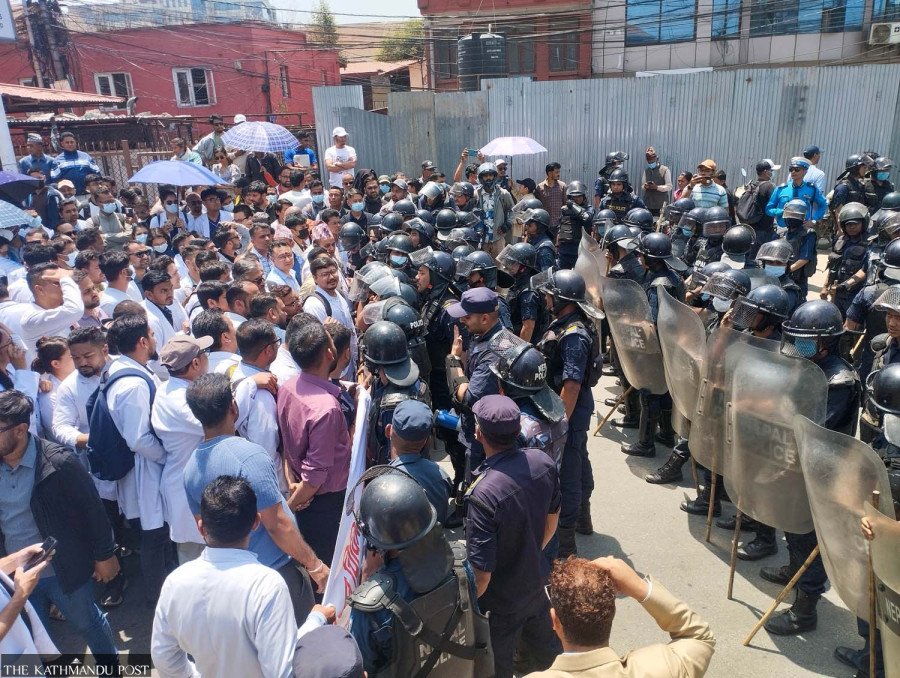National
Doctors across Nepal shunning non-emergency services today
Thousands of patients will be affected as the Nepal Medical Association backs resident doctors’ protests over stipend gap between private and government medical colleges.
Post Report
Tens of thousands of ailing people from across the country will be deprived of treatment on Friday, as the Nepal Medical Association has called a nationwide boycott of all services except emergency and intensive care.
The move by the association, an umbrella organisation of medical doctors, comes in solidarity with resident doctors pursuing MD/MS degrees in private colleges, who have been demanding stipends on par with those of government-owned colleges.
Agitating doctors and postgraduate students also staged a protest at Maitighar Mandal in Kathmandu on Thursday and cordoned off the district administration offices. The NMA representatives and the protesting doctors also held a meeting with Health Minister Pradip Paudel, who expressed support for the demands of the agitating doctors.
“Minister Paudel reiterated that the government is committed to implementing the decision of the 16th meeting of the Medical Education Commission,” said Dr Anil Bikram Karki, president of the association. “But resident doctors need a stipend on par with those of government-owned colleges, not only the minister’s commitment.”
During the meeting with the agitating doctors, Minister Paudel declared that the government would halt all benefits that private medical and dental colleges have been receiving from the Ministry of Health and Population unless they paid remuneration equal to that provided by state-run medical colleges.
Currently, postgraduate students (MD/MS) at government-owned institutions receive Rs48,737 per month, which is equivalent to the salary of a gazetted officer. Private medical colleges, however, have been providing a stipend of only Rs20,000 to postgraduate students.
The 16th meeting of the Medical Education Commission, presided over by Prime Minister KP Sharma Oli, had agreed to fix stipends for postgraduate students from private medical colleges on par with those from government-owned colleges. The decision was made following protests and a boycott of non-emergency services by the agitating postgraduate student doctors in February this year.
Private medical colleges, however, refused to implement the commission's decision, arguing that they are not in a position to increase the remuneration and that the existing law does not compel them to abide by the decision.
“Labour exploitation of resident doctors by private medical colleges must stop, and we are against any kind of labour exploitation,” said Dr Shesh Raj Ghimire, coordinator of the Safe Workplace Struggle Committee for Health Workers. “We have been demanding the implementation of the decision of the meeting of the Medical Education Commission headed by the prime minister.”
When asked about the impact on hundreds of thousands of patients due to the protest, Ghimire said that halting healthcare service is the Nepal Medical Association's decision.
“As a member of the association, it is my obligation to implement the NMA’s decision,” said Ghimire.
Meanwhile, officials at private medical and dental colleges stated that they are ready to increase stipends for new students but are not in a position to raise them for those already enrolled.
“We already provide 33 percent of the total fee we charge to students as a stipend,” said Dr Gyanendra Man Shingh Karki, president of the Association of Private Medical and Dental Colleges, Nepal. “Private colleges should be allowed to hike tuition fees proportionally if stipends have to be increased on par with those of state-owned medical colleges.”
A student pursuing MD/MS in a private medical college pays Rs2.3 million in three instalments.
Karki said that if the remuneration is raised as per the demands of the agitating students, medical colleges would get only Rs16,000 from each student over the three years of study.
Postgraduate students, who are the first to attend to patients, are the backbone of medical colleges. These students have long complained that despite working more than 10 hours a day, they receive minimal pay.
The commission has allocated 1,103 postgraduate seats for enrollment in various medical colleges for this year. State-funded institutions, including Tribhuvan University Teaching Hospital, BP Koirala Institute of Health Sciences, and the National Academy of Medical Sciences, hold around 400 seats only.




 10.12°C Kathmandu
10.12°C Kathmandu














